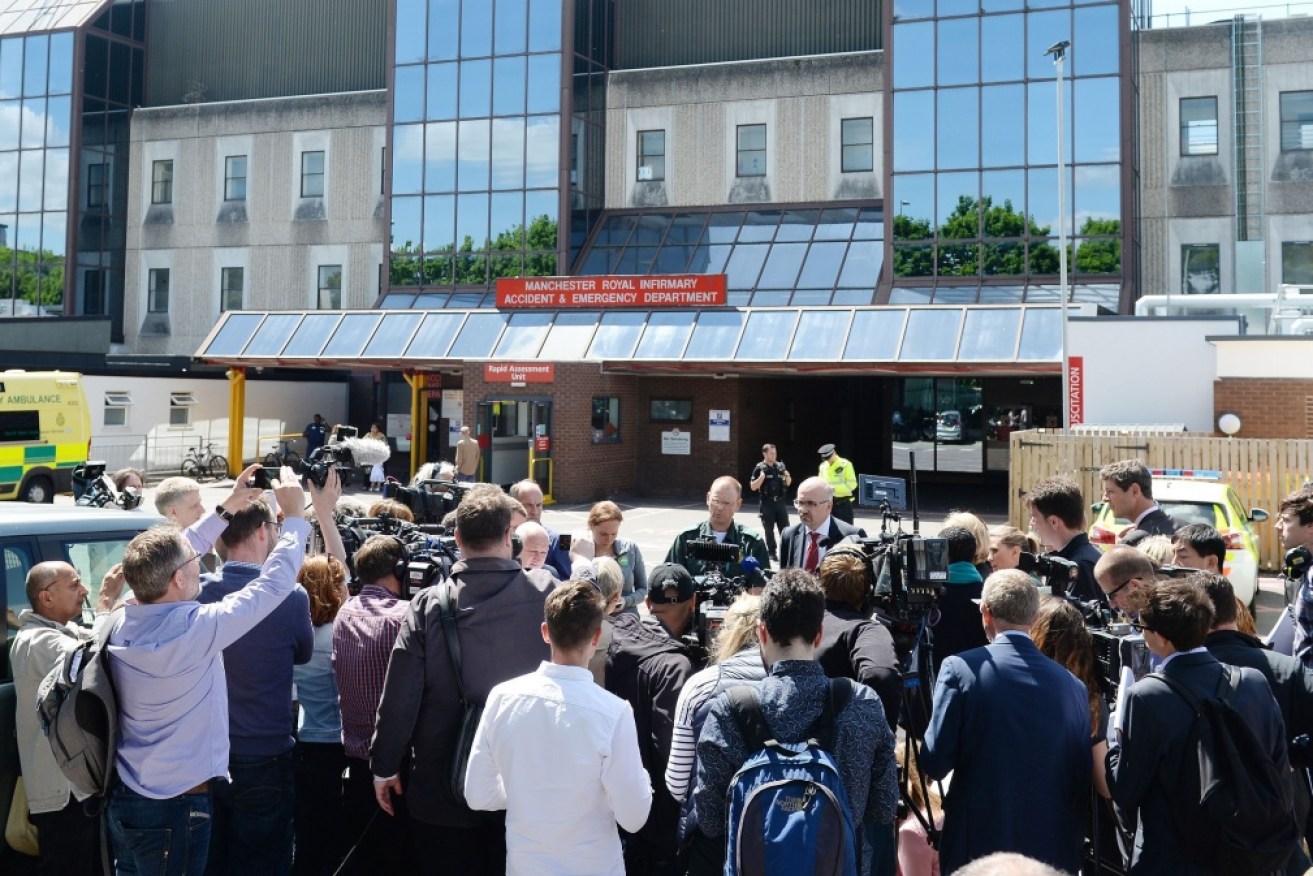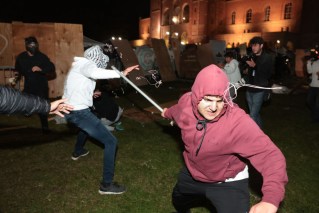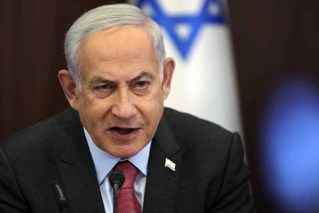Victim of earlier terror attack warns media not to be ghouls with Manchester survivors


Media swarm outside Manchester Royal Infirmary. Photo: Joe Giddens/PA Wire
Reporters covering the Manchester attack have been accused of “intrusively” trying to interview victims as they exit hospital, with actor Hugh Grant and Harry Potter author JK Rowling rallying behind the claims of a former terror victim.
A UK mental health blogger who writes under the name “Dr Em” admitted she had been a victim of a terror incident four years ago and still suffers from the trauma exacerbated by insensitive media coverage.
The Boston Marathon terror attack took place four years ago on April 15, 2013, killing three people and injuring several hundred others, including 16 who lost limbs, near the finish line of the annual run.
Em, who grew up in Manchester, said the actions of reporters in the days after the Manchester arena bombing were eerily reminiscent of her own distressing encounters with journalists following the 2013 incident.
Thread for newspaper editors 👇 https://t.co/xRNVzDSDyG
— J.K. Rowling (@jk_rowling) May 23, 2017
Whole thread important reading. https://t.co/clbBHhoTgG
— Hugh Grant (@HackedOffHugh) May 23, 2017
She said she was “deeply concerned” to see reporters from major news organisations lurking outside Manchester hospitals, waiting to interview and photograph victims.
“When I was caught up in a terrorist incident four years ago, the behaviour of UK media made the trauma much worse,” Em wrote.
“They don’t seem to have changed.”
Em has called on news of all formats — print, digital, TV and radio — to consider their potential role in contributing to post-traumatic stress (PTSD).
“There is evidence on this. Part of the trauma is caused in the aftermath by response,” she said.
“There’s also evidence graphic coverage of terror can create PTSD in people who weren’t even there. It helps no one.
“Editors’ codes need to include behaviour around responsible reporting of major incidents. Intrusive demands can worsen harm to individuals.”
In Em’s personal experience, she described the behaviour of reporters who hounded her for comment as “appalling” and “deeply concerning”.
“It was beyond intrusive. It worsened the trauma and stopped me being able to access support I needed at the time,” she said.
“They got my phone number from work by pretending to be a friend. At a time when I needed support, and to trust others, they made that impossible.”
It also left me unable to trust what was real. Journalists had called and messaged pretending to be people who they weren't to get info.
— Em (@DrEm_79) May 23, 2017
In the days following the 2013 terror incident, Em said journalists appeared unannounced at the doorstep of her mother’s home before her mum knew she was OK, repeatedly called her phone, and took pictures of her in public places.
She said journalists also went to her workplace and, when the receptionist indicated she was unavailable to speak to reporters, printed a story about how Em was “too traumatised” to talk.
Some reporters also repeatedly called the emergency number at the hospital where Em worked, she said.
“[They] used coercive techniques to get a story — [like] if you give us an interview, we’ll stop,” Em said.
“They kept asking me for ‘more colour’ for the story, when all I could see in my mind was a pavement running with blood.
“After a terrorist incident, we don’t need to see people bleeding and crying to know they hurt. They need help and support, not intrusion.”
How to help victims of trauma
Em urged news organisations to remind staff of the Dart Centre’s guidelines to trauma reporting which recognises traumatic experiences “can contribute to considerable psychological distress for victims, survivors, their loved ones, as well as the journalists who tell their stories”.
Melbourne University clinical psychology chair Professor Kim Louise Felmingham told The New Daily victims of trauma should not be “forced” to talk about the event.
“It’s different if people are volunteering to talk about it, but it’s really unhelpful if they’re being pressured into it,” she said.
“It’s common to develop acute stress, irritability and to have trouble sleeping.
“So if they’re being hounded by media, especially if there’s an element of betrayal and deception, they’re going to feel very vulnerable.”
Since Em’s Twitter thread, other victims of terror have spoken out about their own experiences with the media, backing Em’s concerns.
https://twitter.com/lee_dummett/status/866986946727477248
https://twitter.com/mrmitchell78/status/866963064310169600








